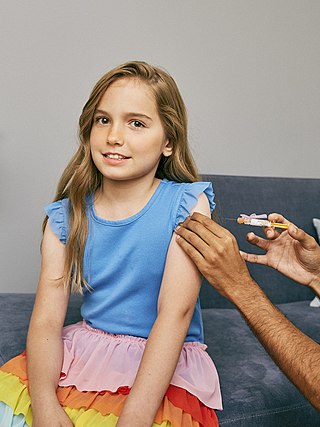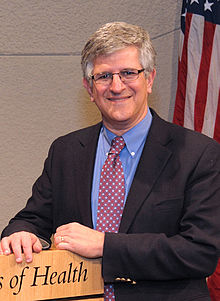
Vaccination is the administration of a vaccine to help the immune system develop immunity from a disease. Vaccines contain a microorganism or virus in a weakened, live or killed state, or proteins or toxins from the organism. In stimulating the body's adaptive immunity, they help prevent sickness from an infectious disease. When a sufficiently large percentage of a population has been vaccinated, herd immunity results. Herd immunity protects those who may be immunocompromised and cannot get a vaccine because even a weakened version would harm them. The effectiveness of vaccination has been widely studied and verified. Vaccination is the most effective method of preventing infectious diseases; widespread immunity due to vaccination is largely responsible for the worldwide eradication of smallpox and the elimination of diseases such as polio and tetanus from much of the world. However, some diseases, such as measles outbreaks in America, have seen rising cases due to relatively low vaccination rates in the 2010s – attributed, in part, to vaccine hesitancy. According to the World Health Organization, vaccination prevents 3.5–5 million deaths per year.

Rotaviruses are the most common cause of diarrhoeal disease among infants and young children. Nearly every child in the world is infected with a rotavirus at least once by the age of five. Immunity develops with each infection, so subsequent infections are less severe. Adults are rarely affected. Rotavirus is a genus of double-stranded RNA viruses in the family Reoviridae. There are nine species of the genus, referred to as A, B, C, D, F, G, H, I and J. Rotavirus A is the most common species, and these rotaviruses cause more than 90% of rotavirus infections in humans.

Stanley Alan Plotkin is an American physician who works as a consultant to vaccine manufacturers, such as Sanofi Pasteur, as well as biotechnology firms, non-profits and governments. In the 1960s, he played a pivotal role in discovery of a vaccine against rubella virus while working at Wistar Institute in Philadelphia. Plotkin was a member of Wistar’s active research faculty from 1960 to 1991. Today, in addition to his emeritus appointment at Wistar, he is emeritus professor of Pediatrics at the University of Pennsylvania. His book, Vaccines, is the standard reference on the subject. He is an editor with Clinical and Vaccine Immunology, which is published by the American Society for Microbiology in Washington, D.C.

Vaccine hesitancy is a delay in acceptance, or refusal, of vaccines despite the availability of vaccine services and supporting evidence. The term covers refusals to vaccinate, delaying vaccines, accepting vaccines but remaining uncertain about their use, or using certain vaccines but not others. The scientific consensus that vaccines are generally safe and effective is overwhelming. Vaccine hesitancy often results in disease outbreaks and deaths from vaccine-preventable diseases. Therefore, the World Health Organization characterizes vaccine hesitancy as one of the top ten global health threats.
The Vaccine Adverse Event Reporting System (VAERS) is a United States program for vaccine safety, co-managed by the U.S. Centers for Disease Control and Prevention (CDC) and the Food and Drug Administration (FDA). VAERS is a postmarketing surveillance program, collecting information about adverse events that occur after administration of vaccines to ascertain whether the risk–benefit ratio is high enough to justify continued use of any particular vaccine.
The 2000 Simpsonwood CDC conference was a two-day meeting convened in June 2000 by the Centers for Disease Control and Prevention (CDC), held at the Simpsonwood Methodist retreat and conference center in Norcross, Georgia. The key event at the conference was the presentation of data from the Vaccine Safety Datalink examining the possibility of a link between the mercury compound thimerosol in vaccines and neurological problems in children who had received those vaccines.
Saul Krugman was a physician, and later pediatrician, whose studies of hepatitis, rubella, and measles resulted in the development of vaccinations for these debilitating diseases. The results of these studies were acquired through unethical medical practices involving experimentation on disabled children, which came to light during the Willowbrook State School scandal of 1987.
The National Vaccine Information Center (NVIC), founded under the name Dissatisfied Parents Together (DPT) in 1982, is an American 501(c)(3) organization that has been widely criticized as a leading source of fearmongering and misinformation about vaccines. While NVIC describes itself as the "oldest and largest consumer-led organization advocating for the institution of vaccine safety and informed consent protections", it promotes false and misleading information including the discredited claim that vaccines cause autism, and its campaigns portray vaccination as risky, encouraging people to consider "alternatives." In April 2020, the organization was identified as one of the greatest disseminators of COVID-19 misinformation on Facebook.
Thiomersal is a mercury compound which is used as a preservative in some vaccines. Anti-vaccination activists promoting the incorrect claim that vaccination causes autism have asserted that the mercury in thiomersal is the cause. There is no scientific evidence to support this claim. The idea that thiomersal in vaccines might have detrimental effects originated with anti-vaccination activists and was sustained by them and especially through the action of plaintiffs' lawyers.
Neal A. Halsey is an American pediatrician, with sub-specialty training in infectious diseases, international health and epidemiology. Halsey is a professor emeritus of international health and director emeritus of the Institute for Vaccine Safety at the Johns Hopkins Bloomberg School of Public Health, in Baltimore, Maryland. He had a joint appointment in the Department of Pediatrics at the Johns Hopkins School of Medicine and serves as co-director of the Center for Disease Studies and Control in Guatemala.
The rotavirus vaccine is a vaccine used to protect against rotavirus infections, which are the leading cause of severe diarrhea among young children. The vaccines prevent 15–34% of severe diarrhea in the developing world and 37–96% of the risk of death among young children due to severe diarrhea. Immunizing babies decreases rates of disease among older people and those who have not been immunized.
The Immunization Alliance is an American vaccine advocacy consortium, assembled under the auspices of the American Academy of Pediatrics (AAP) in May 2008. The Immunization Alliance has called for a governmental information campaign, ongoing research into vaccine safety and efficacy, balanced media coverage, and restoration of confidence among parents due to vaccine hesitancy and the related controversies in autism.

Peter Jay Hotez is an American scientist, pediatrician, and advocate in the fields of global health, vaccinology, and neglected tropical disease control. He serves as founding dean of the National School of Tropical Medicine, Professor of Pediatrics and Molecular Virology & Microbiology at Baylor College of Medicine, where he is also Director of the Texas Children's Hospital Center for Vaccine Development and Endowed Chair in Tropical Pediatrics, and University Professor of Biology at Baylor College of Medicine.

Autism's False Prophets: Bad Science, Risky Medicine, and the Search for a Cure is a 2008 book by Paul Offit, a vaccine expert and chief of infectious diseases at Children's Hospital of Philadelphia. The book focuses on the controversy surrounding the now discredited link between vaccines and autism. The scientific consensus is that no convincing scientific evidence supports these claims, and a 2011 journal article described the vaccine-autism connection as "the most damaging medical hoax of the last 100 years".
Robert William Sears, known as Dr. Bob, is an American pediatrician from Capistrano Beach, California, noted for his unorthodox and dangerous views on childhood vaccination. While Sears acknowledges the efficacy of vaccines—for instance, he supports the claim that Chicken pox, measles, whooping cough, polio, diphtheria have all disappeared because of vaccines—he has proposed alternative vaccination schedules that depart from accepted medical recommendations. His proposals have enjoyed celebrity endorsement but are not supported by medical evidence and have contributed to dangerous under-vaccination in the national child population. While he denies being anti-vaccine, Sears has been described by many as anti-vaccine and as a vaccine delayer.
Frank DeStefano FACPM is a medical epidemiologist and researcher at the Centers for Disease Control and Prevention, where he is director of the Immunization Safety Office.
In the United States, an alternative vaccination schedule is a vaccination schedule differing from the schedule endorsed by the Advisory Committee on Immunization Practices (ACIP). These schedules may be either written or ad hoc, and have not been tested for their safety or efficacy. Proponents of such schedules aim to reduce the risk of adverse effects they believe to be caused by vaccine components, such as "immune system overload" that is argued to be caused by exposure to multiple antigens. Parents who adopt these schedules tend to do so because they are concerned about the potential risks of vaccination, rather than because they are unaware of the significance of vaccination's benefits. Delayed vaccination schedules have been shown to lead to an increase in breakthrough infections without any benefit in lower side effect profiles.
Extensive investigation into vaccines and autism has shown that there is no relationship between the two, causal or otherwise, and that vaccine ingredients do not cause autism. Vaccinologist Peter Hotez researched the growth of the false claim and concluded that its spread originated with Andrew Wakefield's fraudulent 1998 paper, with no prior paper supporting a link.

H. Fred Clark was an American veterinarian, medical scientist, and social activist. He served as a research professor of pediatrics at the University of Pennsylvania's Perelman School of Medicine and at the Children's Hospital of Philadelphia, as well as holding the position of adjunct professor at the Wistar Institute. He is recognized for his work with Paul Offit and Stanley Plotkin developing the rotavirus vaccine RotaTeq. For this work, Clark, Offit, and Plotkin received the Children's Hospital of Philadelphia's Gold Medal in 2006. He received a degree in veterinary medicine from Cornell University and a Ph.D. in microbiology and immunology from the University of Buffalo.
Trudy Virginia Noller Murphy is an American pediatric infectious diseases physician, public health epidemiologist and vaccinologist. During the 1980s and 1990s, she conducted research at Southwestern Medical School in Dallas, Texas on three bacterial pathogens: Haemophilus influenzae type b (Hib), Streptococcus pneumoniae (pneumococcus), and methicillin-resistant Staphylococcus aureus (MRSA). Murphy's studies advanced understanding of how these organisms spread within communities, particularly among children attending day care centers. Her seminal work on Hib vaccines elucidated the effects of introduction of new Hib vaccines on both bacterial carriage and control of invasive Hib disease. Murphy subsequently joined the National Immunization Program at the Centers for Disease Control and Prevention (CDC) where she led multi-disciplinary teams in the Divisions of Epidemiology and Surveillance and The Viral Hepatitis Division. Among her most influential work at CDC was on Rotashield™, which was a newly licensed vaccine designed to prevent severe diarrheal disease caused by rotavirus. Murphy and her colleagues uncovered that the vaccine increased the risk of acute bowel obstruction (intussusception). This finding prompted suspension of the national recommendation to vaccinate children with Rotashield, and led the manufacturer to withdraw the vaccine from the market. For this work Murphy received the United States Department of Health and Human Services Secretary's Award for Distinguished Service in 2000, and the publication describing this work was recognized in 2002 by the Charles C. Shepard Science Award from the Centers for Disease Control and Prevention.










